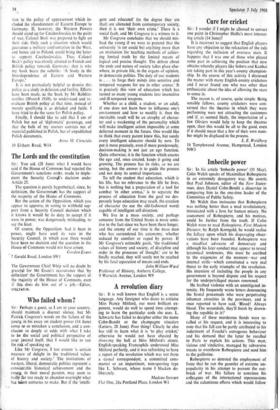Who failed whom ?
Sir : Perhaps a guest, as I am in your country, should maintain a discreet silence, but Mr Patrick Cosgrave's words on the failure of the young in his essay on student power (14 June) come to so mistaken a conclusion, and a con- clusion so deeply at odds with what I take to be the social and political perspective of your journal itself, that I would like to run the risk of speaking up.
Like Mr Cosgrave, I too esteem `a certain measure of delight in the traditional values of history and society.' The institutions of western, liberal, democratic politics represent a considerable historical achievement and the young, in their moral passion, may seem to millik far too ready to abandon overnight what has taken centuries to make. But if the `intern-
gent and educated' (to the degree they are that) are alienated from contemporary society, then it is not `their own crime.' There is a social fault, and Mr Cosgrave is a witness to it.
Mr Cosgrave concludes that we should mis- lead the young if we were to pretend that the university `is (or could be) anything more than an institution for teaching methods of achiev- ing limited truth by the limited means of logical and precise thought. The debate about the ends and nature of society takes place else- where, in private life, in the organs of opinion, in democratic politics. The duty of our students is . . . to forge their minds into sensitive and tempered weapons for use in other arenas.' It is precisely this view of education which has turned so many young students into insensitive and ill-tempered weapons.
Whether as a child, a student, or an adult, if one does not learn how to influence one's environment and how to modify it, then the inevitable result will be an atrophy of charac- ter and a weakening of the personality which will make intelligent action impossible at some deferred moment in the future. One would like to think that every parent knew this, but surely every intelligent educator should by now. To put it more precisely, even if more ponderously, decision-making is not just an ego function. Quite otherwise; it is the function which creates the ego and, once created, keeps it going and growing. The process has its risks, as we are seeing, but the answer is to guide the process and not deny its central importance.
To tell the student that education, which is his life, has no relevance to the life he lives, but is nothing but a preparation of a tool for combat `in other arenas,' is to separate the process of education from the goal we des- perately hope education may reach, the creation of character (to use the old-fashioned word) capable of intelligent self-direction.
We live in a mass society, and perhaps someone from the United States is more sensi- tive to the fact since we have been there longer, and the enemy of our time is the mass man who has surrendered his autonomy, whether seduced by comfort or raped by power. If Mr Cosgrave's estimable goals, `the traditional values of history and society, of discipline and order in the processes of thought,' are to be finally reached, they will surely not be reached by his fatal separation of means and ends.
John William Ward Professor of History, Amherst College, 9 Warwick Avenue, London W9










































 Previous page
Previous page